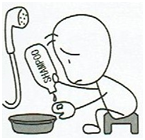V-て形 + しまいます。(完了)
something is finished.

Situation:
Do you like doing sports? You will get sweaty after doing sports, right? After doing sports, you would like to take a shower. There remains little shampoo. It will be used up after today.
✔ When you want to express that something is “totally finished,” use「V-て form + しまいます.」
例1: シャンプーを全部使ってしまいました。
Eg.1: I’ve used all the shampoo.
例2: シャンプーがなくなってしまいました
Eg.2: There is no shampoo.
✔ 「V-て form + しまいます.」can be used for something that is ongoing or to be done soon.
例: 急がないと、日が暮れてしまいます。
(まだ日が暮れていないが、もう少しで日が暮れる。)
Eg.: The sun will fall down if you don't hurry.
(The sun is not fall down yet but will fall down soon.)
-
先生、今日の宿題をしてしまいました。新しい宿題をください。
Teacher, I have finished homework. Please give me new one. -
A:出かけましょう。
B:この手紙を書いてしまいますから、少し待ってください。A: Let's go outside.
B: I will finish this letter soon, please wait.
V-て形 + しまいます。(遺憾)
regretful meaning
Question: Have you ever made any mistake? For example, have you ever forgotten to bring your textbook?
✔ For feelings of making a mistake and regretting, getting disappointed , use 「V-てform+ しまいます。」
例: 忘れました → 忘れてしまいました。
⇒ すみません。教科書を忘れてしまいました。
Eg.: I’m sorry. I forgot to bring my textbook.
※ This grammar cannot be used for something that had been finished.
✔「V-て form + しまいます。」can also be used when you keep doing something and you will get regret or disappointment of it。
例: なります → なってしまいます。
⇒ そんなに遅くまで働いたら、病気になってしまいますよ。
Eg.: If you keep working such late, you will get sick.
✔ In spoken language, it’ll become「V-て form+ ちゃった。」.
例: 忘れます → 忘れちゃった。
⇒ 教科書を忘れちゃった。
Eg.: I forgot my textbook.
-
昨日遅くまでゲームをしていたので、寝坊してしまいました。
I got up late because I played game so late yesterday. -
そんな格好をしていたら、風邪をひいてしまいますよ。
You’ll catch cold if you wear clothes like that. -
そんな使い方をしていたら、こわれてしまいますよ。
You’ll break it if you use like that.
文1(ば形) 、文2~。
V-ば form
✔ 「sentence 1 + V-ば form + sentence 2,」 means that sentence 1 is a precondition for sentence 2 to happen.
✔ how to change to V-ば form :
① For verbs:(→ see N5 Unit42-3.)
.png)
In Group 1, 「ます」is removed from V-ます form, the last vowel 「i」is changed to 「e」 and attached to 「ば」.
in short:[「i」+ ます]→[「i」 + ます]→[ 「e」+ ば]
例: 読みます(yomimasu) → 読めば (yomeba)
⇒ 本を読めば、わかります。
Eg.: If you read the book, you’ll know.
In Group 2, 「ます」is removed from V-ます form and 「れば」is attached.
in short:[V-ます]→[V-ます + れば]
例: 食べます(tabemasu) → 食べれば (tabereba)
⇒ おいしいから、食べればいいのに。
Eg: You should eat it, because it’s delicious.
In Group 3,
・します (shimasu) → すれば (sureba)
⇒ 先生、どうすればいいですか。
What shall I do,teacher?
・きます (kimasu) → くれば (kureba)
⇒ 明日、何時にくればいいですか。
When shall I come tomorrow?
② For い-adj:「い」is removed and replaced with 「ければ」.
in short:[い adj]→[い + ければ]
例: 安い → 安ければ
⇒ 安ければ、買います。
Eg.: If it's cheap, I will buy it.
③ For な-adj:「な」is removed and replaced with「なら」.
in short:[な adj]→[な + なら]
例: 大変な →大変なら
⇒ 大変なら、手伝います。
Eg: If it’s tough, I’ll help you.
④ For noun:add 「なら」after noun.
例: バス →バスなら
⇒ バスなら、5分で行けます。
Eg: If it’s a bus, you can get there in 5 minutes.
-
詳しい「ば形」 → 無料コース & N5のUnit42-3で確認してください。
see free course and N5 Unit42-3.
① V-ば形 + よかったです。
② V-なければ + よかったです。
① should have
② shouldn't have
Situation:
You went out with your friend.
Your friend: Shall we watch a movie or go to an art museum?
You: Let’s watch a movie.
But the movie you and your friend watched wasn’t fun. How did you feel about it?
✔「V-ば form + よかったです。」 expresses feelings of regret or reflection for something that has not been finished.
例1: 美術館へ行けばよかったです。
(実際は、美術館へ行きませんでした。)
Eg.1: I should have went to the art museum.
(Actually, I didn't go to the art museum.)
例2: 早く先生に連絡すればよかったです。
(実際は、先生に連絡しませんでした。)
Eg.2: I should have contacted to teacher.
(Actually, I didn't contact to teacher.)
✔「V-なければ + よかったです。」:expresses feelings of regret or reflection for something that has been finished.
※「V-なければ」is the [ば form] of [V-ない form] .
in short:[V-ない]→[い + ければ]
例1: 見ない → 見なければ
⇒ あんなテレビ、見なければよかった。
(実際は、テレビを見てしまった。)
Eg.1: I shouldn't have watched that TV program.
(Actually, I have watched that TV program.)
例2: 言わない → 言わなければ
⇒ あんなことを言わなければよかったです。
(実際は、あんなことを言ってしまいました。)
Eg.2: I shouldn't have said that word.
(Actually, I have said it.)
例3: 食べすぎない → 食べすぎなければ
⇒ ケーキを食べすぎなければよかったです。いま、お腹が苦しいです。
(実際は、食べすぎてしまいました。)
Eg.3: I shouldn't have ate that much. I'm stuffed now.
(Actually, I have ate so much.)
-
あんなもの、買わなければよかった。
I shouldn't have bought such a thing. -
あんなこと、言わなければよかった(です)。
I shouldn't have said such a thing. -
あんな店、入らなければよかった。
I shouldn't have entered such a shop.
①V-た形 + ほうがいいです。
②V-ない形 + ほうがいいです。
should better do
Situation:
Mr. Tanaka is busy doing work. He goes back home at 11:00 in the evening. He surfs on the Internet for an hour before going to sleep.He doesn’t sleep on bed but on couch. He doesn’t look well recently. You asked him,“You don’t look well recently.”
He said, “I can’t sleep recently.”
What kind of advice will you give him?
✔ When you want to give advices, use 「V-た form + ほうがいいです。」.
例: ベッドで寝たほうがいいですよ。
薬を飲んだほうがいいです。
Eg.: You should better sleep on bed.
Youshould better take some medicine
✔ When you want to give advice not doing something, use「V-ない form+ ほうがいいです。」
例: 遅くまで仕事をしないほうがいいです。
ソファーで寝ないほうがいいです。
Eg.: You should better not work late.
You should better not sleep on couch.
-
A:もっと野菜を食べた/早くたばこをやめた/もう少し運動をした/お酒の量を減らした ほうがいいですよ。
B:そうですね。A: You should better eat more vegetables/quit smoking /exercise a bit more/drink less.
B: You’re right. -
この機会に、ちゃんと 謝った/調べた/治した/修理した/検査を受けた/言った/話した ほうがいいです。
You should better take this opportunity to apologize/search for/fix/repair/take a test/say/speak. -
たばこを吸わないほうがいいです。
You should better not smoke cigarette. -
夜、一人で歩かないほうがいいです。
You should better not walk alone at night.
Notice:
_:Blank
